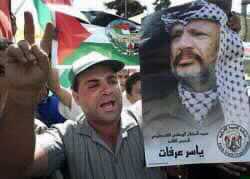Israeli leaders faced a barrage of criticism on Monday after ending a siege of Yasser Arafat under White House pressure to avoid upsetting U.S. plans for possible war on Iraq.Prime Minister Ariel Sharon pulled Israeli tanks out of the Palestinian president's battered West Bank compound on Sunday, ending a 10-day-old standoff that began after resistance bombings killed seven Israelis. "When we made the (siege) decision two weeks ago we did not anticipate to what extent America had already started its countdown to an attack on Iraq, that it would get into a confrontation with the U.N. and Europe and could not suffer another confrontation," Israeli Housing Minister Natan Sharansky told Israel Radio.
While Israel focused on its relations with its main ally and possible U.S. curbs on its military activities against the Palestinians in the runup to a possible conflict in Iraq, daily violence raged on in the West Bank and Gaza Strip .
Israeli occupation soldiers opened fire at stone-throwing youngsters in the West Bank city of Nablus, killing a 10-year-old boy and wounding 18 children, Palestinian witnesses and medical officials said. The occupation army had no immediate comment.
A report issued on Monday by Amnesty International said Israel's military and Palestinian resistance man groups had all shown "utter disregard for the lives of children and other civilians" in two years of bloodshed.
The London-based human rights group said more than 250 Palestinian children had been killed during the Palestinian uprising for statehood. More than 70 Israeli children have died, most of them killed by Palestinian resistance bombers, it said.
EMBARRASSMENT FOR SHARON
In a show of defiance on Sunday, Arafat -- blowing kisses and making a V-for-Victory sign -- emerged from his sandbagged office complex in the wake of clouds of dust from retreating Israeli tanks.
The pullback from Arafat's "Muqata" headquarters was an embarrassing climbdown for Sharon following a message from President Bush demanding a speedy end to the blockade.
Bush's rare rebuke appeared to signal a new dynamic in Sharon's close relationship with the president and in the prime minister's policy toward the Palestinians, who have accused the White House of turning a blind eye to Israeli occupation army clampdowns.
Before launching any future moves against Arafat or a possible Gaza offensive against resistance mans, Sharon would have to weigh the almost certain anger such actions would trigger in Washington as it prepared for action against Iraq.
Israeli newspaper commentators voiced near-unanimous criticism of Sharon's handling of a siege that drew international condemnation. The daily Maariv called it a "colossal failure."
"The lesson for the future: The key to every Middle East deal is in the hands of Bush, him and only him," said Israel's Yedioth Ahronoth daily.
"Muqata pullout hands Arafat a rare victory," read a front-page headline in the left-wing Ha'aretz newspaper.
Sharon was in Moscow, far from the fray at home, for talks with Russian President Vladimir Putin on the Middle East and the possibility of U.S. military action against Iraq.
In a boost for Sharon, Putin said at the start of their meeting: "We welcome your decision to lift the siege of Yasser Arafat's headquarters."
Putin added: "I believe this decision was difficult to take."
Russia had criticized the siege, and its culmination removed a potential obstacle to developing relations with Israel during Sharon's two-day visit.
PALESTINIANS SAY WANTED MEN ESCAPED
Sharon had vowed to lift the siege -- his latest attempt to sideline a leader Washington says should be replaced by Palestinians "not compromised by terror" -- only when Arafat turned over 50 suspected resistance mans holed up with him.
Palestinian officials said many of the wanted men in the compound had slipped away after Israeli forces left. They said it was decided each would fend for himself once the siege ended.
An Israeli security source said: "We have no indications the wanted men have bolted. Reports reaching us say the most prominent ones are still inside."
In the southern Gazan town of Rafah, a Palestinian woman was seriously wounded by a fragment from an Israeli tank shell, Palestinian hospital officials said. Israeli military sources said occupation troops opened fire after coming under mortar bomb attack.
At least 1,573 Palestinians and 601 Israelis have been killed since the Palestinian revolt began in September 2000 after peace talks stalled.
PHOTO CAPTION
A Palestinian demonstrator holds a poster of Palestinian President Yasser Arafat in the West Bank city of Hebron, September 30, 2002. Israel licked its political wounds after ending its siege of Yasser Arafat's compound, under White House pressure to avoid upsetting U.S. plans for possible war on Iraq. (Nayef Hashlamoun/Reuter
- Author:
& News Agencies - Section:
WORLD HEADLINES


 Home
Home Discover Islam
Discover Islam Quran Recitations
Quran Recitations Lectures
Lectures
 Fatwa
Fatwa Articles
Articles Fiqh
Fiqh E-Books
E-Books Boys & Girls
Boys & Girls  Women
Women










